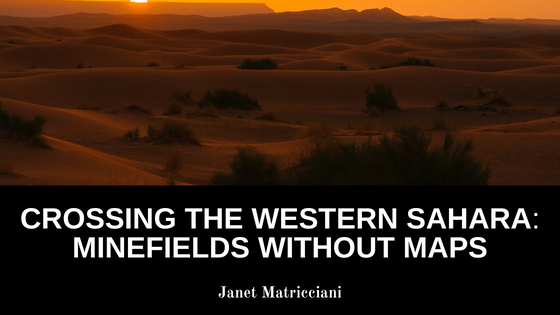I wouldn’t like to be stuck in a minefield after dark without a map, native guide or bomb detection kit, but that is exactly the position I found myself in on the twenty-fifth of August last year. I had been travelling overland from London to Africa with a couple of friends and a rather nice Landrover. My friends were nice too, but less so since we entered the unpleasantly windy and sandy desert region of the Western Sahara.
We were attempting to cross the officially-closed border between Morocco, in the north, and Mauritania, in the south. It has been closed ever since 1975 when King Hassan force-marched half a million Moroccans south into the previously Spanish-held territory of the Western Sahara without the permission of the Mauritanians who border it on their northern side, let alone the nomads who were peaceably inhabiting it. The Mauritanians were annoyed enough to mine their frontier and refuse admittance overland to their country by this route. We had to lie to the Mauritanian ambassador in Spain – there is no embassy in the U.K. – and promise we were only going to enter Mauritania by sea, having put the car on a ferry from Morocco. This was hardly likely as the cost of shipping it would have been five thousand dollars, more money than we had in total, even including Travellers Cheques. To our credit, we are good liars so we got our visas. Once you have driven through the minefield and arrive at the Mauritanian frontier, the border guards allow you to enter their country as they consider it too dangerous to send you back to Morocco. Perhaps I should have written ‘if you make it through the minefield’, as a few months before our journey, a Landrover with four French tourists got blown up when they deviated slightly from the tire-marked path in order to go back to help another vehicle that had got stuck in the sand. They all died, three straight away and one more while on the way to hospital. This was not a pleasant thought as I sat by the Landrover in the moonlight, ignoring the wind that was whipping the sand through my hair so fiercely that it stood on end.
The journey had started out pleasantly enough: three glorious weeks in northern Morocco, followed by a fairly boring journey south through the Moroccan desert region. When we entered the Western Sahara, life changed. Suddenly there were police checks every two hundred yards. Sometimes we could even see the next police check from the one we were currently at. The guards demanded to know our nationalities, passport numbers, and, curiously enough, our parents’ first names. I got bored and started inventing names (Julian and Julia, Abdullah and Fatima, Potted Plant and Small Library), but got no reaction at all.
We finally arrived in Dakhla, a small desert town located at the end of the Western Sahara. Here we reported to the Moroccan authorities in order to secure the paperwork necessary to allow us to join the convoy to Mauritania. (The Moroccan government allows a convoy to leave Dakhla twice a week on its way across the desert to Mauritania. The official policy is ‘if you get blown up, it’s your own fault and don’t come crying to us. Don’t allow your relatives to come crying posthumously to us either.’)
Two days later we were off. Our Landrover had thirteen other vehicles for company: three Toyota pick-up trucks driven by Berbers (Saharan nomads), keen to sell them for massive profits in Mauritania; seven French vehicles, mostly Peugeots, with the same destination as the Toyotas; one Combi-van driven by a gang of crazy Swiss hippies who lived on noodles with tomato sauce; and two German bikers, one of whom later fell off his BMW motorcycle, broke two ribs, and had to be rescued by helicopter from the middle of the desert – but that’s another story.
We were escorted by two Moroccan soldiers. They led us safely to the start of ‘no-man’s land’ at the Moroccan frontier and then disappeared, explaining that they weren’t allowed any further. Personally, I think they lost interest in the journey somewhere where the mines began. Luckily the Berbers had done this journey many times before. Unluckily, they did not wait for the rest of us to catch up, but sped off in their zippy Four-Wheel-Drives, creating a dust storm as they disappeared behind the desert dunes.
The rest of our group drove slowly on, following the tracks that the Berbers had left in the sand, until night fell and it seemed prudent to wait for daylight when we would again be able to see their path (and some of the land mines, most of which were less than ten feet from the route and visible after months of wind had blown their cover of sand away).
We rested in the howling wind and ate noodles with tomato sauce cooked by the hippies. Lashings of sand rendered the meal tasteless but crunchy, a texture I would get used to in the desert country of Mali, where even the bread is baked with gravel as it is apparently impossible to separate it out from the flour prior to cooking.
The next day those who had managed to sleep awoke perkily at dawn as the rest of us wearily shook the sand out of our clothes, only to be re-covered in it the moment we stepped out of our tents. I was surprised to find that desert sunrises are not glorious golden rays creeping slowly over the horizon, but rather a pale hazy light that goes from dark grey to light grey in a matter of moments, and then stays that way. My view may have been coloured by the stomach cramps that I had gotten from eating too much sand.
We attempted to follow what was left of yesterday’s vehicle tracks, not an easy task as the wind had done its best to erase most of them. The other travellers asked us if we would mind taking the lead as our Landrover was super-strong (a V8 engine) and could create a path for the rest of them. ‘And that way you guys get blown up first’, they could have added. We drove cautiously on, stopping from time to time to get out and help push stuck vehicles out of the sand. We refused to drive back and tow them with our Landrover, as we may have been nice enough to lead the way, but we weren’t stupid enough to leave the path. (Statistics such as four dead French are quite enough without the need to add four English people to them.)
Finally, we saw the Mauritanian border post in the distance. As we arrived, a guard carrying a rifle rushed out gesticulating wildly. We didn’t know whether he wanted us to slow down, speed up, or pull over so we crawled forward, holding spare tire caps in front of our faces for bullet protection as this was the nearest available metal that we had. The guard asked us where the rest of our group was (‘On their way, officer’), and then led us over to his table and took out a big black book. He carefully began to write down passport details, but did not ask our parents’ names, a fact I considered quite odd as I had been led to believe that these were of national importance after our experiences in Morocco. Wanting to show off my local knowledge, I turned to my friends and said, “He must be one of the ten percent of Mauritanians who the guide-book says are literate”. “I’m also one of the two percent who speak English”, he added angrily, as I cowered in shame. I took refuge in the Landrover until he had finished with all the formalities. Several black book entries later, we were free to continue. “Welcome to Mauritania. Nouadhibou is the nearest town and it’s fifty miles that way”, said the guard, pointing somewhere behind my back. I felt relieved to be out of the desert and about to be back on a real road.
I turned and looked in the direction in which he had just indicated. I found myself staring at hundreds of virgin sand dunes stretching as far as the eye could see, without even the ugly trace of tire marks. The wind was starting to pick up speed as vultures circled overhead.
Welcome to Mauritania, indeed.

